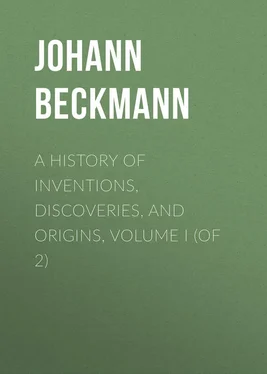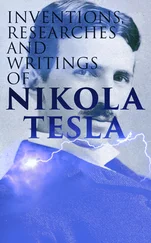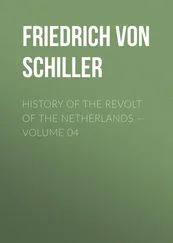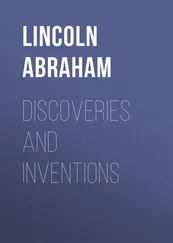Johann Beckmann - A History of Inventions, Discoveries, and Origins, Volume I (of 2)
Здесь есть возможность читать онлайн «Johann Beckmann - A History of Inventions, Discoveries, and Origins, Volume I (of 2)» — ознакомительный отрывок электронной книги совершенно бесплатно, а после прочтения отрывка купить полную версию. В некоторых случаях можно слушать аудио, скачать через торрент в формате fb2 и присутствует краткое содержание. Жанр: foreign_antique, foreign_prose, на английском языке. Описание произведения, (предисловие) а так же отзывы посетителей доступны на портале библиотеки ЛибКат.
- Название:A History of Inventions, Discoveries, and Origins, Volume I (of 2)
- Автор:
- Жанр:
- Год:неизвестен
- ISBN:нет данных
- Рейтинг книги:4 / 5. Голосов: 1
-
Избранное:Добавить в избранное
- Отзывы:
-
Ваша оценка:
- 80
- 1
- 2
- 3
- 4
- 5
A History of Inventions, Discoveries, and Origins, Volume I (of 2): краткое содержание, описание и аннотация
Предлагаем к чтению аннотацию, описание, краткое содержание или предисловие (зависит от того, что написал сам автор книги «A History of Inventions, Discoveries, and Origins, Volume I (of 2)»). Если вы не нашли необходимую информацию о книге — напишите в комментариях, мы постараемся отыскать её.
A History of Inventions, Discoveries, and Origins, Volume I (of 2) — читать онлайн ознакомительный отрывок
Ниже представлен текст книги, разбитый по страницам. Система сохранения места последней прочитанной страницы, позволяет с удобством читать онлайн бесплатно книгу «A History of Inventions, Discoveries, and Origins, Volume I (of 2)», без необходимости каждый раз заново искать на чём Вы остановились. Поставьте закладку, и сможете в любой момент перейти на страницу, на которой закончили чтение.
Интервал:
Закладка:
Though it might be expected that the great share which new inventions and discoveries have at all times had in effecting such happy changes among mankind would have secured them a distinguished place in the annals of nations, we find with regret, that the pen of history has been more employed in recording the crimes of ambition and the ravage of conquerors, than in preserving the remembrance of those who, by improving science and the arts, contributed to increase the conveniences of life, and to heighten its enjoyments. So little indeed has hitherto been done towards a history of inventions and discoveries, that the rise and progress of part of those even of modern times is involved in considerable darkness and obscurity: of some the names of the inventors are not so much as known, and the honour of others is disputed by different nations; while the evidences on both sides are so imperfect, that it is almost impossible to determine to which the palm is due. To Professor Beckmann, therefore, those fond of such researches are much indebted for the pains he has been at to collect information on this subject; and though he has perhaps not been able to clear up every doubt respecting the objects on which he treats, he has certainly thrown much light on many curious circumstances hitherto buried in oblivion.
The author, with much modesty, gives to this work in the original the title of only Collections towards a History of Inventions: but as he has carefully traced out the rise and progress of all those objects which form the subject of his inquiry, from the earliest periods of their being known, as far as books supplied information, and arranged his matter in chronological order, the original title may admit, without being liable to much criticism, of the small variation adopted in the translation. The author, indeed, has not in these volumes comprehended every invention and discovery, but he has given an account of a great many, most of them very important.
Should any one be disposed to find fault with the author for introducing into his work some articles which on the first view may appear trifling, his own words, taken from the short preface prefixed to the first volume of the original, will perhaps be considered as a better exculpation than anything the translator might advance in his favour. “I am sensible,” says he, “that many here will find circumstances which they may think unworthy of the labour I have bestowed upon them; but those who know how different our judgements are respecting utility, will not make theirs a rule for mine. Those whose self-conceit would never allow them to be sensible of this truth, and who reject as useless all ore in which they do not observe pure gold, as they display very little acuteness, must be often duped by the tinsel glare of false metal; and they give me as little uneasiness as those who have no desire to know the origin of inventions, or how they were brought to their present utility. If my extending the term Invention farther than is perhaps usual, by comprehending under it several police-establishments, be a fault, it is at any rate harmless, and on that account may be pardoned without much apology.”
MEMOIR OF THE AUTHOR
John Beckmann, Professor of Œconomy at Göttingen during a period of forty-five years, was born at Hoye, a small town in the kingdom of Hanover, in 1739. His father held the appointment of postmaster and receiver of taxes in that place, and at the same time cultivated a small farm, which appears to have inspired his son with a taste for agricultural pursuits. The superintendence of his education devolved principally on his mother, a woman of great prudence and strength of mind, who was left a widow when young Beckmann was scarcely seven years old. In a lonely house, amid examples of industry and daily labour, he passed his youth in the perusal of works, which, although of a common-place description, were not without their use, as they led him to contract a methodical habit of mind, and afforded considerable information on various subjects, which in the sequel greatly assisted him in the pursuits to which he owed his celebrity. He himself relates that, when quite a boy, he was in the habit of making extracts of all the striking passages he met with in the course of his reading, by which means he acquired a ready use of the pen. The insufficient circumstances of his family prevented his education being cultivated in the schools till nearly fifteen; at which age he was sent to the Gymnasium of Stade, then under the direction of Gehlen, where in a short time he highly distinguished himself in classical literature. Intended for the clerical profession, he entered the university of Göttingen in 1759, for the purpose of completing his theological studies; but whether the advice of Hollmann (afterwards his father-in-law), with whom he had formed a close intimacy, produced a change in his plans, or that the mathematical instructions of Professors Kaestner and Mayer were more congenial to his mind than divinity, he abandoned the career marked out for him, and devoted himself to the natural sciences and their application, as well as to mathematics; whilst he cultivated philology with such zeal, that he ultimately made himself master of ten different languages. In order to gain greater proficiency in these pursuits, he made a journey in 1762 to the Netherlands, but returned to Hoye in the following year, in consequence of the serious indisposition of his mother, who dying shortly afterwards, left him destitute of guidance, and in the greatest anxiety respecting his future prospects. At this juncture Büsching advised him to travel to St. Petersburg, where, upon the strong recommendations with which he was provided, he was speedily appointed to the chair of Natural Philosophy. Shortly after, Büsching, quitting the institution, returned to Germany, and dissensions having arisen among the directors, Beckmann likewise resigned his office. He then proceeded to Sweden, with the view of acquiring a detailed knowledge of the working of the mines in that country; making his principal sojourn at Upsal, where he became acquainted with Linnæus, and enjoyed the friendship and hospitality, as well as the instructions, of that eminent naturalist 7. Leaving Sweden, he directed his course to Denmark, visiting Copenhagen and other towns, where he examined the various museums, libraries and manufacturing establishments. On arriving at Altona, he found there his friend Büsching, who recommended him to Münchhausen, curator of the Academy of Göttingen. After paying a visit to his brother at Marburgh, he proceeded to Hanover; and being approved of by Struve, then president of Göttingen under Münchhausen, he was appointed, in 1766, Professor Extraordinary of Philosophy to that university, of which he eventually became one of the brightest ornaments.
His lectures upon œconomy had the recommendation of novelty, and produced so much applause, that in 1770 he was made ordinary professor of that science. They were attended by the flower of the studious youth of all countries, Göttingen being at that period one of the most popular universities in Europe; and many even of the distinguished statesmen and public functionaries of Germany did not disdain to be ranked among his auditors. He was in the habit of accompanying them himself into the workshops, to give them a practical knowledge of the different processes and handicrafts of which he had explained the theory. Once a week, also, he held a Practicum Camerale , a scientific meeting, at which he explained subjects of œconomy, administration, and finance, illustrating them by readings from a great variety of sources. He composed, to serve as a guide in this course of instruction, treatises on rural œconomy, policy, finance, commerce, and other departments of knowledge; which, though since carried to a higher degree of perfection, owed to Beckmann their first systematic form. He never entirely relinquished these public lectures, but insensibly his private studies took a direction altogether historical, the motives for which it may not be uninteresting to point out.
Читать дальшеИнтервал:
Закладка:
Похожие книги на «A History of Inventions, Discoveries, and Origins, Volume I (of 2)»
Представляем Вашему вниманию похожие книги на «A History of Inventions, Discoveries, and Origins, Volume I (of 2)» списком для выбора. Мы отобрали схожую по названию и смыслу литературу в надежде предоставить читателям больше вариантов отыскать новые, интересные, ещё непрочитанные произведения.
Обсуждение, отзывы о книге «A History of Inventions, Discoveries, and Origins, Volume I (of 2)» и просто собственные мнения читателей. Оставьте ваши комментарии, напишите, что Вы думаете о произведении, его смысле или главных героях. Укажите что конкретно понравилось, а что нет, и почему Вы так считаете.












